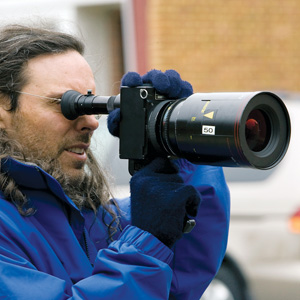WHAT PROFIT it a man … ? Jesus’ question was on comedy director Tom Shadyac’s mind. There were already elements of spirituality in his Bruce Almighty and Evan Almighty. The director was in the process of giving away his money when he got to the point described in his confessional new Cinequest entry, I Am.
A bad fall from a mountain bike had left Shadyac in months of agony. When he recovered, he decided to make a film about the troubles of the world. He interviewed great minds to discuss what needs to be done. One doesn’t have to be religious to follow Shadyac’s arguments; I Am‘s title is not a reference to Jehovah.
No matter what I’ve written about kitschy spiritual movies over the decades, I enjoy talking about the interconnection of all living things and the importance of pacifism as much as any Dr. Bronner’s soap-company copywriter. But when the director blames science and technology for muddling the ancestral wisdom of native peoples, or makes rounds to the Noetic Institute, or hooks himself up to a tub of yogurt—then I Am starts heading into the direction of What the Bleep Do We Know!?.
Over the phone from Seattle, I wonder what the Tom Shadyac of 10 years ago would have asked about his film. “I guess I would have asked, ‘How much is it going to gross?’” he says. “Today I’m more concerned about how well it is expressing its ideas in the form of entertainment.”
When he was considering making this film, had anyone quoted to Shadyac the plot of Sullivan’s Travels, Preston Sturges’ parable about the do-gooder filmmaker who learns his comedies do more for the world than his world-saving earnestness?
Shadyac replies, “I’ve never believed that my comedy didn’t have a value—the value of helping people see things from another color or perspective. My film Ace Ventura is scripture, as far as I’m concerned. It’s an amazing thing to create a vulnerability to laughter and a connection between people. That’s what I love about the journey, and I’m hoping I Am is part of it. ”
Shadyac’s Patch Adams, a punching bag to critics, is perhaps more forgivable when you learn that his father, Richard, was the CEO of fundraising for St. Jude’s Hospital for children.
The late elder Shadyac was a lawyer, and in I Am, he seems skeptical that humans will ever evolve into altruism. His son suggests: “The cultural malaise is so thick he couldn’t see what’s in our nature. My father’s life—and the creation of the hospital—shows how you can change the world with compassion.”
I Am gives a lesson in the actual biological basis for compassion as a survival tool. We see the physical symptoms—the choking up—demonstrated effectively with a news clip of a little boy surprised in his classroom by his father.
Shadyac filtered through other clips before choosing this: “I was looking for something short and quickly effective. The television news focuses on aberrations: they can’t show us the 10 million acts of compassion, respect or kindness that happen every day. That’s why Thoreau and Emerson agreed that ‘he is a wise man who never reads newspapers.’”
Discourse from Rumi scholar Coleman Barks and Desmond Tutu are also part of this film’s studies of selflessness. One of the most articulate subjects is radio host and author Thom Hartmann, who often raises a voice against economic injustice, “the banksters” and the greed of the right wing. Loving your enemies is noble, but ideally you want to have some political leverage against them.
Hartmann had talked politics in the interviews, but Shadyac hadn’t included it in the film. “Thom is all about philosophical rooting in politics. This film is more about what the Dalai Lama says here: ‘Critical thinking first, and then action.’ I didn’t want to specify what that action should be.”
After Cinequest, Shadyac is taking his film on the road. “I’m hoping to go as wide as possible, to put this anywhere it can be seen. I’m honored and humbled to be a part of this discussion.”
I AM
(U.S.; 76 min.)
March 2 at 7pm
SJ Rep

 Sports Roundup: Mar. 2-8
Sports Roundup: Mar. 2-8  Review: ‘Swan Lake’
Review: ‘Swan Lake’ 


